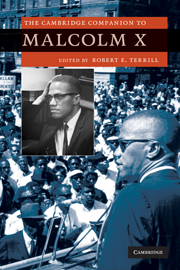Book contents
- Frontmatter
- Introduction
- 1 Malcolm X and Elijah Muhammad
- 2 Autobiography and identity: Malcolm X as author and hero
- 3 Bringing Malcolm X to Hollywood
- 4 Malcolm X and black masculinity in process
- 5 Womanizing Malcolm X
- 6 Malcolm X and the Black Arts Movement
- 7 Malcolm X and African American conservatism
- 8 Malcolm X and youth culture
- 9 Homo rhetoricus Afro-Americanus: Malcolm X and the “rhetorical ideal of life”
- 10 Judgment and critique in the rhetoric of Malcolm X
- 11 Nightmarish landscapes: geography and the dystopian writings of Malcolm X
- 12 Afrocentricity and Malcolm X
- 13 Malcolm X in global perspective
- 14 The legacy of Malcolm X
- Guide to further reading
- Index
12 - Afrocentricity and Malcolm X
Published online by Cambridge University Press: 28 May 2010
- Frontmatter
- Introduction
- 1 Malcolm X and Elijah Muhammad
- 2 Autobiography and identity: Malcolm X as author and hero
- 3 Bringing Malcolm X to Hollywood
- 4 Malcolm X and black masculinity in process
- 5 Womanizing Malcolm X
- 6 Malcolm X and the Black Arts Movement
- 7 Malcolm X and African American conservatism
- 8 Malcolm X and youth culture
- 9 Homo rhetoricus Afro-Americanus: Malcolm X and the “rhetorical ideal of life”
- 10 Judgment and critique in the rhetoric of Malcolm X
- 11 Nightmarish landscapes: geography and the dystopian writings of Malcolm X
- 12 Afrocentricity and Malcolm X
- 13 Malcolm X in global perspective
- 14 The legacy of Malcolm X
- Guide to further reading
- Index
Summary
Afrocentricity, as an intellectual idea, owes much of its popularity to the political trajectory charted by Malcolm X. This is not to claim that he was an Afrocentrist for clearly there were elements of Malcolm's life that were not strictly Afrocentric. Indeed the Afrocentric paradigm, as conceptualized by Ama Mazama, declares that Africans' liberation “rests upon the ability to systematically replace European ways of thinking, being, consciously replace them with ways that are germane to the African cultural experience.” One could argue that Malcolm's attachment to Islam in many ways mirrored that of other Africans to Christianity and that the latter was problematic from an Afrocentric perspective. Although Malcolm was clearly on the road toward a full appreciation of the subject position of Africans within our own history, he was not sufficiently knowledgeable of historical processes to incorporate information about the role of Africans in African or world history in his discourse. He was, on the other hand, devoted to seeking the rise of a black nationalist consciousness, which in itself was a major step toward the idea of mental liberation. Afrocentricity is a paradigmatic intellectual perspective that privileges African agency within the context of African history and culture transcontinentally and trans-generationally. This means that location is essential to any analysis that involves African culture and behavior whether literary or economic, political or cultural.
- Type
- Chapter
- Information
- The Cambridge Companion to Malcolm X , pp. 150 - 157Publisher: Cambridge University PressPrint publication year: 2010
- 2
- Cited by



